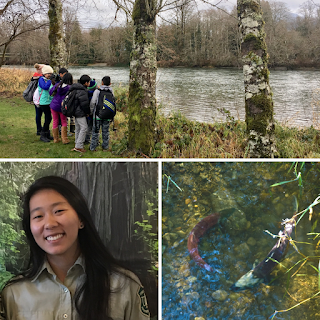Developing educational curriculum
What might “Sammy the Salmon” write to their friend “Reggie the Bald Eagle” on a postcard? AmeriCorps Individual Placement (IP) member Kelsey Chun developed a new Eagle Watcher’s program this winter to teach fourth-grade students about the life cycles of these important creatures. She serves as a Youth and Community Engagement Coordinator with Mount Baker-Snoqualmie National Forest. Kelsey uses the pen-pal storyline between the salmon and eagle to illustrate their migration journeys, and mutual dependence on the Skagit River - ancestral land of the Upper Skagit Indian Tribe. Climate change affects eagles’ survival in many ways, including the bodies of water upon which they rely for fish and other food.
 |
| Kelsey serves as a Youth and Community Engagement Coordinator for Mount Baker-Snoqualmie National Forest through WCC's IP program. Photos from Kelsey Chun. |
Many of our IP members educate adults and children about wildlife, our local landscape, and climate change. Making content accessible is a priority.
“Based on feedback from the teachers and their ideas for new content, I included information related to landforms and presented many of the key vocabulary terms in both Spanish and English,” Kelsey said. “Madison Elementary is a dual language school, and the students were excited about sharing their knowledge of words for animals and the land: la águila, el salmón, las migraciones, las montañas, los ríos.”
Collaboration in restoration projects
As a keystone species and a cornerstone of the cultural identity of Pacific Northwest Indian tribes, salmon are a big deal! From local non-profits to government entities, so many people are working to make sure salmon survive and thrive. As climate change increases water temperatures across Washington, collaborating to restore and preserve salmon habitat is even more important.
A prime example comes out of Port Hadlock, where North Olympic Salmon Coalition (NOSC) sponsors one of our restoration field crews. In December 2018, the crew added native trees and shrubs to Snow Creek-Salmon Creek Unit, a site where the two summer chum and coho-bearing streams converge to enter Discovery Bay in Jefferson County. The project is a 15-year effort to restore the riparian and nearshore habitat. Partnerships between NOSC, WCC, Washington Department of Fish and Wildlife, Jefferson Land Trust, Jefferson County Conservation District, and others, is a huge part of the project’s success.
“This [site] was originally planted by a WCC crew I led in 2003,” said WCC Restoration Specialist and Crew Supervisor Owen French. “Since then, projects have extended out to the estuary and bay, and miles upstream on both public and private lands.” Habitats at the site include scrub-shrub, marsh, and forested wetland, wet upland meadows, and estuary.
 |
| AmeriCorps members serving on our NOSC restoration crew plant native trees and shrubs at Snow Creek-Salmon Creek unit. Photo contributed by Owen French. |
Members serving with our NOSC restoration crew contribute to restoration projects by planting thousands of native trees and shrubs. Through these experiences, our members gain an understanding of the importance of collaborative relationships in long-term restoration efforts.
"The relationships I have developed let me view ecological restoration as a holistic process…serving with NOSC lets me see the evolution of watershed recovery through multiple stages and seasons, talking with employees who bring their own specialties and perspectives to the table," said WCC member Jose Garrido.
Since October, the crew has planted nearly 15,000 trees for NOSC and partner organizations at sites across Clallam and Jefferson Counties!
Empowering leaders of all types
We believe successful solutions come from diverse perspectives, talents, and backgrounds. In the WCC, this means welcoming everyone to the table, or rather, welcoming everyone to the power tool, to the opportunity to try on a leadership role for size, and to spend a year of their lives improving our environment.
One leadership opportunity we offer members is the assistant supervisor role on field crews. Selected by the crew supervisor, the assistant leads their crew on select trail or restoration projects, and attends a dedicated leadership training with other assistants from crews across the state.
 |
| Assistant Supervisor Olivia Sohn uses a metal cutter to break up large metal debris found along the Pickering Barn Trail in Issaquah. Photo by AmeriCorps member Ryan Grate. |
Olivia Sohn, a first-year member from Renton, is the assistant supervisor on an Issaquah- based crew completing trail and restoration projects across King County. “This year I've had the opportunity to build my confidence working with power tools and leading the crew. It feels great to improve these skills while restoring stream habitat in Washington,” said Olivia.
Mentoring the next generation of environmental leaders and providing a foundation of hands-on experience is the core of WCC’s mission. We are grateful for our many alum supporting and leading solutions-oriented projects within environmental organizations across the state. We look forward to seeing the creative solutions our members will go on to implement!

1 comment:
Our WCC AmeriCorps program is helping build tomorrow's environmental and community leaders today. Come and be part of something bigger than yourself today!
Post a Comment